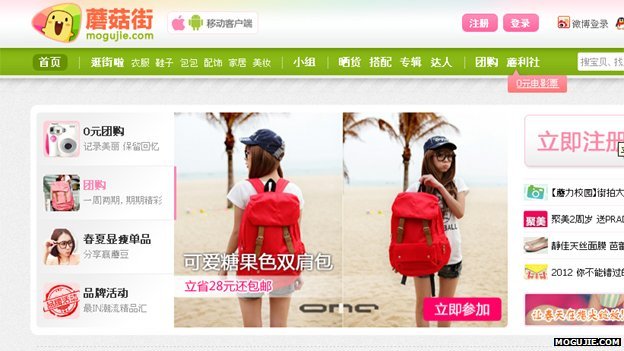Pinterest clones have flooded China’s web world – only months after the original social photo-sharing website reached massive popularity.
Pinterest has recently surpassed 10 million users, in record time.
Copying it seems to be the latest cloning trend in China – a country known for copying the designs of everything from shoes and cars to iPads and tech start-ups.
Tech blogs say there are about 20 Chinese clones of Pinterest already.
Some copycats modify the original site’s design only slightly, while others go a step further.
Several have taken the basic idea of “pinning” and sharing theme-based photos a bit further, for example changing the interface to allow online shopping.

In China, locals joke that they have much more choice of products than in the Western world – and in a way, they do.
Local markets offer anything and everything that looks like the original version, but often with subtle differences.
And the online world is no stranger to cloning.
For instance, in 2011 copycats of a social network Tumblr were popping up here and there, with one of the most popular clones being Diandian.
Even a major Chinese Facebook clone, Renren, and China’s microblogging site Sina Weibo, dubbed a hybrid of Facebook and Twitter, launched their own Tumblr-type blogs – Renren Stations and Qing.
But in the second half of 2011, Pinterest clones started to emerge.
One of the most recent ones is Alibaba Group’s social shopping platform Fa Xian.
It was launched only four weeks ago in a test mode, but already has some 60,000 viewers a day.
Just like Pinterest, it lets users “pin” images of items on virtual pinboards, where others can then post comments.
But with a different twist, Fa Xian lets people shop, too – anything pinned on the platform is available for purchase through two Alibaba-operated websites, Taobao Mall and Taobao Marketplace.
Besides Fa Xian, two other Pinterest clones have proved a huge success in China – Mogujie.com and Meilishuo.com.
But instead of letting users “pin” images from anywhere on the web, they only offer content from China’s biggest e-commerce site, Taobao.com.
On Mogujie, visitors can buy items as well.
And just like sharing “pinned” Pinterest images on Facebook and Twitter, Chinese clones allow you to share on Sina Weibo and Tencent Weibo, another Twitter copycat.
There are other Pinterest clones that, just like the original website, do not allow users to shop and open the entire web space for “pinning” images.
They include Qihu 360’s, Woxihuan.com, Huaban.com and iCaitu.com.
